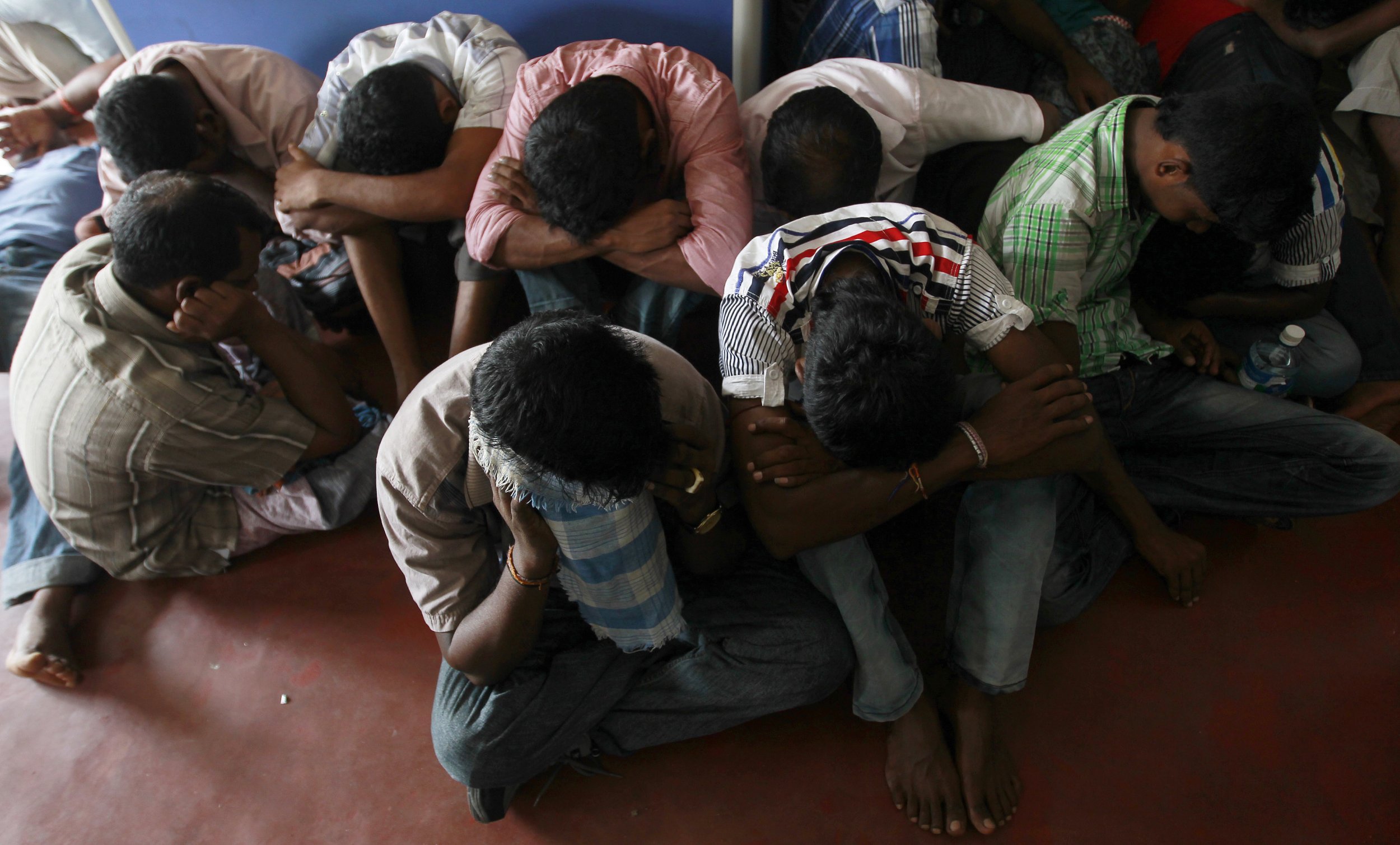
SYDNEY/COLOMBO (Reuters) - A boatload of asylum seekers intercepted by the Australian navy and returned to Sri Lanka is to be handed over to the police, a Sri Lankan naval spokesman said on Monday, a move bound to fuel concerns about Australia's hard-line policy and rights abuses in Sri Lanka.
Australia said the 41 people on board were transferred to Sri Lankan authorities on Sunday, but declined to comment on a second boat reported to be carrying an additional 153, saying only that it was not currently in Australian waters.
Australian border patrol personnel intercepted the first vessel carrying 41 Sri Lankans west of the remote Cocos Islands last week, after they were suspected of entering Australian waters illegally.
Neither the Australian government nor Sri Lankan officials gave details of how the group was transported back to the site of the transfer, which Australia said occurred in "mild" conditions off the eastern Sri Lankan port of Batticaloa.
Sri Lankan navy spokesman Kosala Warnakulasuriya said the group would be handed over to the country's Criminal Investigation Department later on Monday.
"They will be brought to (the southwestern port of) Galle and will be handed over to the CID," Warnakulasuriya told Reuters.
Rights groups and some Western countries have raised concerns with Sri Lanka over alleged human rights violations during the final phase of the war against Tamil separatists that ended in 2009. Sri Lanka says many asylum seekers are economic migrants, but rights groups say Tamils seek asylum to prevent torture, rape and other violence at the hands of the military.
In a statement on Monday, 53 Australian legal scholars said the country's actions "raise a real risk" of forcing people back to their place of origin, where they are expected to face persecution. That would breach Australia's obligations under international refugee and human rights law.
"These people are being held on the high seas, without being allowed to contact lawyers, challenge their detention in court or speak with family and friends," said Ben Saul, a law professor at Sydney University who signed the statement.
At worst, Australia's actions constitute "enforced disappearance", Saul said, and the government's secrecy around what it calls 'Operation Sovereign Borders' disrespects its voluntary commitments under United Nationsconventions.
That echoes concerns voiced by the UN last week about the Australian government's brief assessment of the asylum seekers' claims when reports of the two boats first emerged. The government declined to comment at the time, continuing a policy of refusing to talk about "on-water operations".
"There was a lot of shrill and hysterical claims that were made over the course of the past week," Australian Immigration Minister Scott Morrison told 2GB radio. "None of those has proved to be true."
Morrison said the 37 Sinhalese and four Tamils went through what he called an "enhanced screening process" before the handover, adding that one Sinhalese was entitled to a further refugee assessment but had "voluntarily requested" to return. The vessel was at no stage in distress and all aboard were safe, he said.
When asked directly about a second boat, Morrison said it was not in Australian waters, but declined further comment, saying he would make further statements when other such operations were completed.
The incident comes on the eve of a visit by Morrison this week to Sri Lanka, where he is due to talk with government and defence officials and attend a ceremony with President Mahinda Rajapakse to mark Australia's gift of two former patrol vessels.
In the past three months, three Tamil asylum seekers on temporary visas in Australia, facing the prospect of being returned to Sri Lanka, have set themselves on fire. Two died.
RETURNING THE BOATS
Australian Prime Minister Tony Abbott came to power last September partly because of his tough stance on asylum seekers.
While his popularity has since plummeted, more than 70 percent of Australians support the government's border policy, including sending boats back when safe to do so, according to a recent poll by the Lowy Institute think tank.
"The government will continue to reject the public and political advocacy of those who have sought to pressure the government into a change of policy," Morrison said in a statement on Monday.
"Their advocacy, though well intentioned, is naively doing the bidding of people smugglers who have been responsible for almost 1,200 deaths at sea."
The government has touted its success in blocking asylum seeker boats, saying there have been no illegal arrivals since last December.
Australia received 16,000 asylum seeker applications last year, just under 0.5 percent of the 3.6 million lodged worldwide, UN figures show, a drop from 1 percent in 2010.
Opposition Greens Party lawmaker Sarah Hanson-Young told the Australian Broadcasting Corp there was "nothing legal about the way (the government) has conducted these operations. They fall far short of our international obligations". The Greens plan to move a motion in parliament this week demanding more detail on the case.
Uncommon Knowledge
Newsweek is committed to challenging conventional wisdom and finding connections in the search for common ground.
Newsweek is committed to challenging conventional wisdom and finding connections in the search for common ground.
About the writer
To read how Newsweek uses AI as a newsroom tool, Click here.








